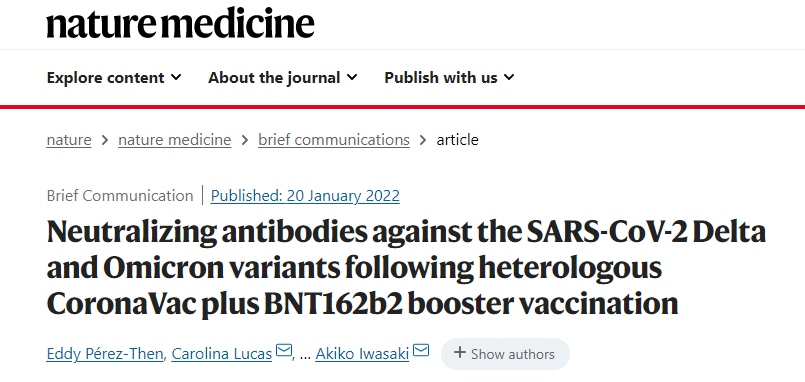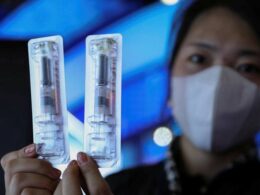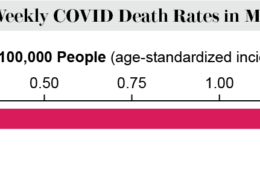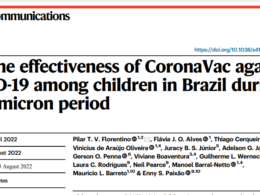An additional booster shot — and possibly two — are clearly needed in areas of the globe where the Sinovac shot has been chief source of vaccination
News Yale
By Bill Hathaway
january 20, 2022
Millions of people around the world have received two shots of Sinovac, a Chinese-manufactured inactive vaccine that is used in 48 countries to help reduce transmission rates of COVID-19.
However, those vaccinations alone are of no help against the widely circulating omicron variant, shows a new study by researchers at Yale and the Dominican Republic. The results are published in the journal Nature Medicine.
An analysis of blood serum from 101 individuals from the Dominican Republic showed that omicron infection produced no neutralizing antibodies among those who received the standard two-shot regimen of the Sinovac vaccine.
Antibody levels against omicron rose among those who had also received a booster shot of the mRNA vaccine made by Pfizer-BioNTech.
But when researchers compared these samples with blood serum samples stored at Yale, they found that even those who had received two Sinovac shots and a booster had antibody levels that were only about the same as those who’d received two shots of the mRNA vaccines but no booster shot.
In other studies, the two-shot mRNA regimen without a booster has been shown to offer only limited protection against omicron.
Also, the researchers found that individuals who had been infected by earlier strains of the SARS-Cov-2 virus saw little immune protection against omicron.
The findings will likely complicate global efforts to combat the omicron strain, which has supplanted the more dangerous but less transmissible Delta strain as the most dominant circulating virus in much of the world.
An additional booster shot — and possibly two — are clearly needed in areas of the globe where the Sinovac shot has been chief source of vaccination, said Akiko Iwasaki, the Waldemar Von Zedtwitz Professor of Immunobiology and senior author of the paper.
An additional booster shot — and possibly two — are clearly needed in areas of the globe where the Sinovac shot has been chief source of vaccination
“Booster shots are clearly needed in this population because we know that even two doses of mRNA vaccines do not offer sufficient protection against infection with omicron,” Iwasaki said.
Omicron has proven particularly problematic to combat because it possesses 36 mutations on the spike proteins on its surface, which the virus uses to enter cells, researchers say.
Existing mRNA vaccines are designed to trigger antibody response when spike proteins are recognized.
Iwasaki stressed, however, that the human immune system still has other weapons it can use against COVID-19, such as T cells that can attack and kill infected cells and prevent severe disease.
“But we need antibodies to prevent infection and slow transmission of the virus,” she said.
Carolina Lucas and Valter Silva Monteiro, both from the Yale School of Medicine, are co-lead authors of the paper. Eddy Perez-Then, of the Health Ministry of the Dominican Republic, and Marija Miric, of Two Oceans Health in Santo Domingo, are co-lead authors.
Originally published at https://news.yale.edu on January 20, 2022.
Names mentioned
Akiko Iwasaki, the Waldemar Von Zedtwitz Professor of Immunobiology and senior author of the paper.
Carolina Lucas and Valter Silva Monteiro, both from the Yale School of Medicine, are co-lead authors of the paper.
Eddy Perez-Then, of the Health Ministry of the Dominican Republic, and Marija Miric, of Two Oceans Health in Santo Domingo, are co-lead authors.
ORIGINAL PUBLICATION

Neutralizing antibodies against the SARS-CoV-2 Delta and Omicron variants following heterologous CoronaVac plus BNT162b2 booster vaccination
Nature Medicine
Eddy Pérez-Then, Carolina Lucas, Valter Silva Monteiro, Marija Miric, Vivian Brache, Leila Cochon, Chantal B. F. Vogels, Amyn A. Malik, Elena De la Cruz, Aidelis Jorge, Margarita De los Santos, Patricia Leon, Mallery I. Breban, Kendall Billig, Inci Yildirim, Claire Pearson, Randy Downing, Emily Gagnon, Anthony Muyombwe, Jafar Razeq, Melissa Campbell, Albert I. Ko, Saad B. Omer, Nathan D. Grubaugh, Sten H. Vermund & Akiko Iwasaki
Abstract
The recent emergence of the SARS-CoV-2 Omicron variant is raising concerns because of its increased transmissibility and by its numerous spike mutations with potential to evade neutralizing antibodies elicited by COVID-19 vaccines. Here, we evaluated the effects of a heterologous BNT162b2 mRNA vaccine booster on the humoral immunity of participants that had received a two-dose regimen of CoronaVac, an inactivated vaccine used globally. We found that heterologous CoronaVac prime followed by BNT162b2 booster regimen induces elevated virus-specific antibody levels and potent neutralization activity against the ancestral virus and Delta variant, resembling the titers obtained after two-doses of mRNA vaccines. While neutralization of Omicron was undetectable in participants that had received a two-dose regimen of CoronaVac vaccine, BNT162b2 booster resulted in a 1.4-fold increase in neutralization activity against Omicron, compared to two-dose mRNA vaccine. Despite this increase, neutralizing antibody titers were reduced by 7.1-fold and 3.6-fold for Omicron compared to ancestral and Delta variant, respectively. Our findings have immediate implications for multiples countries that previously used a CoronaVac regimen and reinforce the notion that the Omicron variant is associated with immune escape from vaccines or infection-induced immunity, highlighting the global need for vaccine boosters to combat the impact of emerging variants.
Originally published at https://www.nature.com












